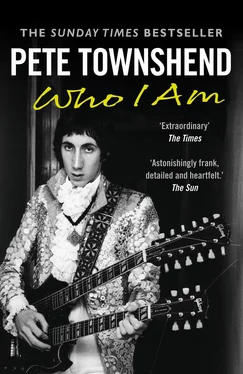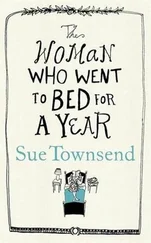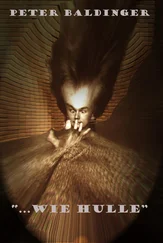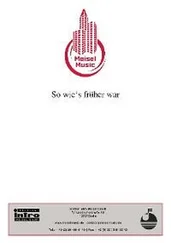‘Dad had agreed to let me go, and to let me take you with me. Then Dennis got a new job in the Middle East,’ Mum explained. ‘Dennis was an ex-RAF officer with qualifications abroad, very presentable, and because of the mess he got me into here he put his name down for a job outside the country. He finally got a position in Aden. Big money.’
But then Dad had a change of heart.
‘As soon as Cliff knew it was Aden I was taking you to, he came back and said, “Sit down, I want to tell you something.” I had our tickets, yours and mine. Cliff said, “I’ve changed my mind; you’re not taking Peter. It’s too far away. Think about it, do you still want to go?” So I thought about it, and in the end I decided to give things one more try with your father.’
I wondered what Mum meant by ‘the mess’ Dennis Bowman had got her into? Had she become pregnant? ‘Yes. I was in very bad shape in that respect.’ She hesitated. ‘I’d had some miscarriages.’ She paused for a long moment. ‘Self-inflicted miscarriages.’ After having one back-street abortion Mum had decided that from then on she would end her pregnancies herself. ‘I did it five times.’
I was seven, and happy to be home again, back in the noisy flat with a toilet in the back yard and the delicious aroma of Jewish cooking from upstairs. It was all very reassuring. Jerry Cass still played his radio – the BBC Third Programme, classical music, mainly orchestral – incredibly loudly for fifteen minutes every morning as he shaved. (I still like to wake up to Radio 3, as it’s now called.) As I settled back into my old routine, life seemed full of promise. Dad was still often away on tour or at one-night-performances, but Mum was always around, sometimes distracted, but no longer willing to rely on Denny to look after me.
In 1952 the Squadronaires began a regular summer engagement at the Palace Ballroom in Douglas, on the Isle of Man, that would continue for ten years. That first season we rented a flat for the entire holiday, and Mum, still extricating herself from her love affair, got a secret box number at the post office where she would collect Dennis Bowman’s daily letter.
The one-bedroom holiday flat we stayed in was on the lower-ground floor of a large block. My bed was in the living room, an upgrade from the dining room. I would wake occasionally to Dad creeping about in bare feet, coming in late from a night in the bar, or trying to slip out.
I loved Jimpy like a brother. He and I played fantastical and elaborate games. We were also great explorers. In Douglas, the capital of the Isle of Man, where Jimpy was staying with us, we discovered a crumbling old mansion surrounded by high walls that we climbed to steal apples. The house seemed abandoned. We managed to get into an outside room and, peering through a keyhole, could see an old vintage car. Through another keyhole we saw a table covered in what appeared to be treasure – old watches, tools, chains. We tried to force the doors, but they were absolutely secure.
Being explorers was fun, but the biggest treat of all was watching the Squadronaires. This meant dressing up smartly and getting a few shillings from Mum for crisps and milk-shakes. Before the dances began we’d stand in the middle of the huge empty floor and bounce gently up and down – the entire floor was on springs. Then we were free to wander, listen to the music and watch the bouncing hemlines of the teenage girls dancing. Sometimes we’d practise dance steps of our own at the edge of the oak dance floor.
On Sundays there were concerts at the Palace Theatre next to the ballroom, where the Squadronaires would accompany visiting artists, some quite special: Shirley Bassey, Lita Roza, Eartha Kitt, Frankie Vaughan, the Morton Fraser Harmonica Gang, and a string of comedians – even, I think, George Formby plunking away at his silly little banjo. I remember a novelty guitar player who strummed an electric guitar while playing a tiny harmonica in his mouth. He looked ridiculous, and the harmonica was so high-pitched it sounded like a squeaking mouse trapped between his teeth. However, he became a regular at these concerts, so it obviously went down well with the crowd.
Seeing this, I became keen on learning the harmonica, and began playing Dad’s quite seriously.
There were wonderful times on the Isle of Man that year. I fell in love with the younger blonde girl who lived next door. One day, while playing at ‘Mums and Dads’, I had her wrapped in my arms in a play-tent and felt for a moment like a real adult. I remember her mother telling me later that the little girl would be a ‘heartbreaker’ when she grew up. I had no idea what she meant, despite my own rapidly beating heart.
Near the end of this first Isle of Man holiday, Mum brought Denny over and left me in her care while she returned to London to end her affair with Dennis Bowman. Mum and Dad began to put their love life back together that autumn. They tried hard to have a second child to stabilise the family and provide me with a sibling. I know now that the reason it took so long – my brother Paul wasn’t born until five years later – was Mum’s battered reproductive system. She might not have put herself through all that abuse had she been clearer about which man she was going to settle on.
It must have been difficult for my proud father to take Mum back after Dennis Bowman. I don’t believe he knew about her abortions, but if he had, or even suspected anything, it might help explain his drinking and his absences. It could also explain why, after they reconciled, he seemed most at ease with his wife and family when he was tipsy; only then could he express words of love.
In September 1952 I started at Berrymede Junior School. I remember coming home to Denny’s face peeping out through the french windows like a strange, trapped animal. Mum and Dad had given her their bedroom, which she’d filled with the sad booty of her years as Mr Buss’s mistress – sterling silver hairbrushes, manicure sets and Ronson table-lighters. I wish I could say I felt sorry for her, but I don’t believe I did.
Around this time I became a fire-starter. I went door-to-door borrowing matches from neighbours, claiming Mum’s oven had gone out. I didn’t set light to any houses, just to piles of rubble on bomb sites, or old cars. One day I misjudged things: I created a city with building blocks underneath a refrigerated van I took to be abandoned, then stuffed the city with paper and set it alight. The van’s occupant came out screaming: ‘Petrol! Petrol! You’ll kill us all!’
On another destruction-minded day Jimpy and I laid a huge piece of steel across the railway tracks under the bridge and stood back. As the train approached we ran away, waiting to hear the sound of a terrible train crash. This could have not only injured or killed a lot of people, but led us into a very different life, in the penal system. Thank God the train passed without derailing.
At home our chief entertainment was radio. Television had arrived on the scene in 1952, but our family, like millions of others, waited until 1953 and the Queen’s Coronation before buying a TV set. I also read a lot of comics and enjoyed Enid Blyton’s Noddy books, which first appeared in 1949 and were still pretty new. Dad made a model sailing boat that we sometimes took to the Round Pond in Hyde Park on Sunday. He also took me greyhound racing, which I found magical, especially at White City Stadium. And he always gave me far too much pocket money.
Berrymede was in a poor neighbourhood of South Acton, and one day in my first term at school I told a boy in the playground that Dad earned £30 per week. He called me a liar – the average wage was less than a third of that – but I stuck to my guns because I knew it was true. We nearly came to blows over it before a teacher intervened, warning me to stop telling lies: ‘No one earns that much money. Don’t be stupid!’
Читать дальше












